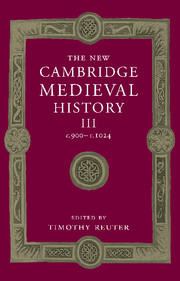Book contents
- Frontmatter
- 1 Introduction: reading the tenth century
- PART I GENERAL THEMES
- PART II POST-CAROLINGIAN EUROPE
- PART III NON-CAROLINGIAN EUROPE
- Appendix genealogical tables
- List of primary sources
- Bibliography of secondary works arranged by chapter
- Index
- Frontispiece
- Plate section
- Map 2: Archbishoprics and bishoprics in the early eleventh century
- Map 4: Germany
- Map 13: Byzantium in 1025
- References
1 - Introduction: reading the tenth century
Published online by Cambridge University Press: 28 March 2008
- Frontmatter
- 1 Introduction: reading the tenth century
- PART I GENERAL THEMES
- PART II POST-CAROLINGIAN EUROPE
- PART III NON-CAROLINGIAN EUROPE
- Appendix genealogical tables
- List of primary sources
- Bibliography of secondary works arranged by chapter
- Index
- Frontispiece
- Plate section
- Map 2: Archbishoprics and bishoprics in the early eleventh century
- Map 4: Germany
- Map 13: Byzantium in 1025
- References
Summary
the present volume covers a period in European history best described as the ‘long tenth century’, stretching from the 890s through to around 1020/30. Though this volume covers Byzantine history of the period and also Islamic history so far as it impinges on European territory, the emphasis in this introduction will be largely on what was or would become the Latin west. I shall try to sketch what currently seem the main concerns of historians working on the period and what are generally seen as its salient features, though any such attempt will probably date far faster than the substantive chapters which follow. The ways in which historians make and have made sense of the period as a whole have been determined by a range of inputs. Before we can look at the general trends which are currently held to characterise the period (and the extent to which they actually do) we need to examine these inputs. The most important of them is the nature, real and perceived, of the available source-materials. But two others are almost as important. The first comes from the traditional and non-traditional interpretative schemata and periodisations which the community of professional scholars has brought to bear. The second, perhaps even more important, is the fact that the members of this community for the most part work and have worked within specific historiographical traditions.
Keywords
- Type
- Chapter
- Information
- The New Cambridge Medieval History , pp. 1 - 24Publisher: Cambridge University PressPrint publication year: 2000
References
- 3
- Cited by

